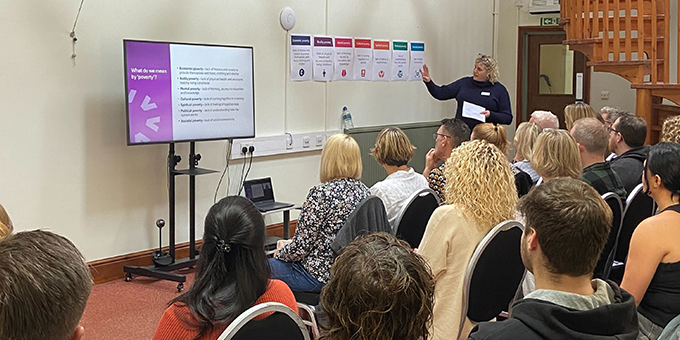In the lead-up to the International Day for the Eradication of Poverty on 17 October, ASDAN held a staff learning day led by our new CEO, Melissa Farnham. The event provided an opportunity to focus on broadening our enrichment curriculum and expanding our programmes and qualifications to engage, elevate, and empower not only young people, but also adults experiencing various forms of poverty.
The day focused around deepening our understand of the seven types of poverty and how ASDAN can support those affected through education:
-
Economic poverty – lack of finance and assets to provide themselves with food, clothing and shelter
-
Bodily poverty – lack of physical health and access to healthy living conditions
-
Mental poverty – lack of thinking, access to education and knowledge
-
Cultural poverty – lack of coming together in a society
-
Spiritual poverty – lack of feeling of togetherness
-
Political poverty – lack of understanding how the system works
-
Societal poverty – lack of social connectivity
During a workshop, we explored how our current curriculum offer addresses these types of poverty and discussed how ASDAN’s new qualifications development can better equip these learners.
“Moving forward, we want to pay attention to the bigger gaps within education and beyond education” says Melissa, CEO of ASDAN. “One audience we’re focusing on in particular is the UK’s ‘ghost children’ – those who haven’t been accounted for in an education setting or registered as EOTAS (educated other than at school). We’re thinking about those adults living in the shadow of education who may be fathers or mothers of some of the children that ASDAN could really be supporting and positively impacting,” says Melissa.
The latest Good Childhood Report (Spring 2024) revealed that 23% of parents and carers found it difficult to manage financially, and one in six children and young people living in households in financial strain had low life satisfaction.
Although the government and media focus on economic poverty, financial poverty can be the catalyst of young people and adults experiencing all other types of mental, cultural and societal poverty, which lead to barriers within their learning journey.
ASDAN offers strong solutions. Our courses develop life skills and provide support for learners of all ages and abilities. We invited Tom Magill, Artistic Director of ESC Films to speak at ASDAN’s learning day. ESC Films use ASDAN’s Short Courses to develop the skills and self-esteem of adult prisoners in Northern Ireland and adults in forensic mental health units.
Tom’s powerful speech highlighted how poverty limits choice and emphasised the long-term impact of Adverse Childhood Experiences (ACEs). You can read more about his work in our interview: “ASDAN reaches people that society has ignored” – Prisoners in Northern Ireland create Macbeth adaptation.

Six skills at the heart of ASDAN education
In September 2024, NFER published their report The Skills Imperative 2035: Shifting sands: Anticipating changes in the future labour market and supporting the workers at greatest risk. Within their report, they introduce their six essential employment skills – communication, collaboration, problem-solving, organising, planning and prioritising work, creative thinking and information literacy. These skills aim to reduce barriers that might prevent people transitioning into employment.
When ASDAN was founded in the 1980s, we identified six core skills essential to young people's development. Over the next 6-12 months, we will build on these foundational skills as a framework to provide tailored, trauma-informed support and life skills development for learners experiencing poverty.
“For young people who have experienced trauma, such as migrant children” says Melissa “instead of placing them in the special educational needs (SENCO) system, we need to go beyond that and provide more holistic support focused on developing core life skills.”
ASDAN’s refreshed six core skills include:
-
Learning
-
Communication
-
Decision making
-
Thinking
-
Team working
-
Self-awareness
This updated skillset will ensure our courses remain relevant in today’s evolving education system.
Developing an ASDAN 'Learner membership’
We’re creating a ‘Learner membership’ to ensure that a young person or adult’s journey with an organisation is not disrupted, even if their circumstances change, eg moving schools, homes, authorities, etc.
ASDAN’s goal is to provide a learner "passport" that retains engagement and allows their progress and journey to be tracked, rather than having to start over if their situation changes.
ASDAN has a dynamic future ahead and has its learners’ needs at the very forefront of its strategy. Our focus is on retaining learner engagement and raising awareness of the charity's holistic capabilities to support vulnerable people experiencing poverty. We look forward to updating you on our own learning journey in the months ahead.
